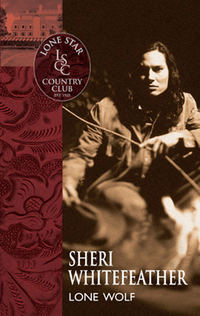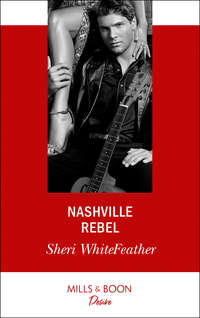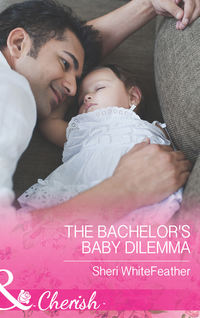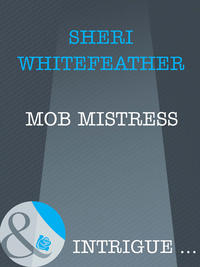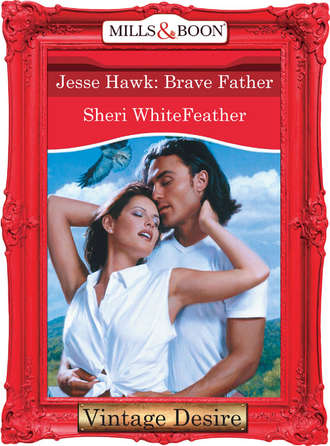
Полная версия
Jesse Hawk: Brave Father
Patricia straightened her spine, preparing for a battle Jesse would surely force her to wage. He knows, she told herself, taking a deep breath. He found out about Dillon.
“I’ll see Mr. Hawk, Susan. There’s no need for Security.”
Within seconds Patricia’s door opened, and Jesse shouldered by the receptionist. Petite and pale, Susan looked like a quivering mouse next to him, eager to escape something even more dangerous than a surly tomcat. A grizzly, Patricia decided. A grizzly with long black hair and gunmetal eyes. When in God’s name had Jesse gotten so big?
Avoiding his glare, Patricia rose and nodded to the receptionist. “Thank you, Susan. Please hold my calls.” She glanced at her watch, determined to keep her manner professional. “I’ll let you know when this meeting ends.”
The woman cast a wary glance at Jesse, who kept his stare focused on Patricia. “Yes, Miss Boyd.” She darted out the door and closed it soundly.
“Well…” Patricia smoothed her jacket. Did she look as nervous as she felt, or did her red suit boast confidence? She lifted her chin. If her designer apparel didn’t, then certainly the plush office should.
“Can I get you some coffee?” she asked, sweeping her hand toward a wet bar. “Or would you prefer something cold?” Like the frost glazing your eyes.
“Cut the crap, Tricia.”
He strode toward her, his faded denims and casual T-shirt mocking the decor. Suddenly the hours of labor spent perfecting the office seemed insignificant. He dwarfed the room and all of its high-powered pretense.
“Do you have a child?” he asked. “An eleven-year-old boy?”
She resisted the urge to remove the scarf draped around her neck. Deep, calming breaths were difficult as it was, and the flowing strip of silk felt like a noose. “Yes.”
He stepped closer. Dangerously close. “And am I his father?”
“Yes.”
“And tell me,” he said, moving closer still, “did you know you were pregnant when I left town? Did you know then that you were carrying my child?”
“Yes,” she stated once again, refusing to offer an explanation. She had begged him to come back for her. The fault was his.
He stood dead still, his metallic eyes boring into hers. “Do you know how hard it is not to hate you right now?”
“No harder than it is for me,” she shot back. Love and hate were only a fine line apart. And she had loved him once. Loved him beyond comprehension.
She wanted to scream, claw his skin and make him bleed. But instead she stood facing him as years of pain stretched between them. God help her. Jesse was back, making her insides ache all over again. Everything hurt: her lungs as they battled for air, her heart as it pumped erratic beats. Yes, she struggled not to hate him. How could she not?
“By the way,” she said, angry that he hadn’t asked, “your son’s name is Dillon.”
He flinched, and those eyes, those slate-gray eyes lightened, softening his stare. He repeated the name in a near whisper, his voice cracking. “Dillon.”
Patricia glanced away. She didn’t want to see that side of Jesse, the vulnerable, gentle side she had loved. In that moment he could have been eighteen again—the teenage boy who had pledged “forever.” The man she’d almost come to hate. The thought made her sad and sick inside.
Jesse raised his voice to a commanding level once again. “I want to see Dillon. As soon as possible. I have a right to see my son.”
She reached toward the edge of her desk, felt for the ridge and leaned against it. “I’m sorry, but Dillon isn’t ready to meet you.” That truth intensified the sickness, especially when Jesse jerked as though he’d been struck.
“What?” He pulled his hands through his hair. “Oh, God, what are you saying? Does he know about me? Does he know I’m his father?”
“Yes, he knows, he’s just confused right now.” She gestured for Jesse to sit, and surprisingly he did, lowering himself onto a contemporary leather sofa. She seated herself beside him. “This isn’t easy for Dillon.” She thought about her son, about his sensitive, protective nature. “He used to ask about you, but now that so many years have passed, I think he’s gotten used to the idea of not having a father.”
Jesse scrubbed his hand across his jaw. “Did he tell you he didn’t want to meet me, or are you just assuming—”
“He told me,” she answered honestly. “And he asked me not to go back to your house. Made me promise I wouldn’t.”
Jesse’s breath hitched. Big, strong and vulnerable, she thought. He looked as though he wanted to cry, bury his head in his hands and let the tears flow. Patricia touched his shoulder and felt it shake. He was, she realized, as hurt and confused as Dillon. He leaned toward her, reached up and skimmed his fingers across her cheek. She wanted to cry, too. Cry for their youth and what should have been.
Patricia closed her eyes as images of Dillon flashed through her mind—birthday parties, skinned knees, warm hugs, toothless grins, fevers, chicken pox. Years of motherhood. A sweet, loving little boy who had waited for his father to return.
She opened her eyes and pushed Jesse’s hand away. “Damn you. Why didn’t you come back?”
He clenched the hand that had touched her, his face still except for a twitching muscle in his cheek. “Because I didn’t know I had a child,” he hissed. “You stole him from me. Dillon is my flesh and blood as much as yours, but you kept him for yourself. You didn’t want me involved in his life.”
“Stole him?” She moved to the edge of her seat. “I gave birth to him. Loved him, rocked him, fed him from my breast. And I told him about his father. Good things. But you didn’t come back and prove me right. So I’d say Dillon has the right to decide if you’re worth meeting.”
He rose and began to pace the room, the restless movement reminding her of Dillon. How alike yet different they were. Father and son. Strangers.
“Oh, God,” he said, anguish vibrating his voice. “What if Dillon never wants to meet me?”
She took a deep breath, composing herself. Watching Jesse hurt didn’t seem to ease her own pain, the ache he’d renewed. “Dillon will come around. He’s just angry…upset that—” She paused, exhaled again. “He knows that you and I—that our reunion hasn’t been a friendly one.”
Jesse stopped pacing and turned to face her. “That’s what’s wrong? You and me?”
“Dillon’s a sensitive child. It bothers him that we’re not friends,” she said, grateful she hadn’t been forced to reveal the conversation Dillon had stumbled upon. She hadn’t forgiven herself for that act of irresponsibility. Her son’s emotional well-being had been jeopardized simply because she hadn’t thought to close a door.
Jesse trapped her gaze. “I’m taking you to dinner tonight.”
Patricia startled. “What?”
“Our son wants us to be friends.”
Just like that? Sit down for a cozy dinner and wipe away years of pain? Two people who not more than ten minutes before had admitted they were battling hatred? She stood to face him. “You’re crazy.”
“Damn it, Tricia. Don’t you dare fight me on this.” He took one of her business cards off the desk and handed her a pen. “Write your address down. I’ll pick you up at seven.”
She did as he asked and shoved the card back at him. For Dillon, she told herself. She’d do it for Dillon. Deep down she knew the boy wanted a father.
“We’ll go to The Captain’s Inn.” Scowling, he grabbed the pen and tossed it back onto her desk; it rolled off and landed on the floor. “But remember, this isn’t a date. We’re making peace with each other for the sake of our son.”
Well, she thought as he left her office and shut the door with a smart bang, we’re off to one hell of a start.
Three
Jesse came home to find Sally, a six-foot iguana, speculatively eyeing Barney, an animated African gray parrot. Apparently in the mood to show off, the chatty bird sat atop the lizard’s terrarium reciting gibberish he’d picked up from the television. Since Barney had figured out the buttons on the remote control, he spent his days switching channels. He adored the clatter of game shows and cartoons, but occasionally Jesse caught the bird tuned in to a soap opera, his head cocked curiously.
“Hi, guys,” Jesse said, as he passed. Barney and Sally didn’t know that in the real world, lizards and birds weren’t supposed to be friends. Although Jesse’s woodsy home boasted plenty of greenery and primitive artifacts, it was hardly a jungle. Barney and Sally had been hand raised in captivity.
Turning the corner, he strode into the kitchen. Uneven stacks of dirty dishes cluttered the chopping-block counters. He blew a windy sigh and filled the sink with warm water, adding a fair amount of soap. Dissolving dried pancake syrup and crusty chili would take some elbow grease. He wasn’t the sort to ignore chores, household or otherwise, but his organized existence had gone to hell and back since he’d set eyes on Tricia again.
Keeping busy was important, he decided, and pacing the floor with cigars in his pocket wouldn’t do. He might be a new father, but his son wasn’t an infant. Dillon Hawk was eleven years old. And although it wrenched his heart, he couldn’t blame the boy for being apprehensive about meeting him. Apparently Dillon respected his mother enough to stand up for her honor, something a young brave had the right to do.
He dunked another set of dishes and wondered how he and Tricia were going to tackle friendship. It was, of course, Jesse’s only option if he wanted a healthy relationship with his son.
What was the boy like? he wondered. Was he tall for his age? Dark or fair in coloring? Shy? Outgoing? Did he wear his baseball caps reversed, or did he avoid hats altogether? What television shows did he watch? Was there a girl in the neighborhood he had a painful crush on, or was Tricia the only female who had yet to influence his life?
As Jesse scoured a frying pan, he tried to envision the items on Tricia’s shiny black desk. Had there been a framed photograph he’d missed—a snapshot of his son? He’d been too keyed up to even think about searching for a picture, much less grill Tricia for sentimental facts.
Her secret had blinded him from anything but rage. Damn her for not telling him about their baby—for making him miss the first eleven years of his son’s life. She knew how badly he had wanted children, how he longed for a family of his own. But Jesse had given up on that dream soon after Tricia’s betrayal. Children meant a wife, and a wife meant falling in love—something he never intended to do again. Sure, maybe the weak part of him had never quit missing Tricia, but the other side, the proud, willful side, had suffered from her disloyalty—almost to the point of hating her for it. And now, God help him, he had no choice but to befriend her.
A deafening sound drew Jesse’s attention. He dried his hands and went back into the living room where Barney had decided to blast the volume on the TV.
Having abandoned the iguana, the African gray patrolled the coffee table, protecting the remote control like an armed guard.
“Come on, pal, that’s too loud.” Jesse reached for the remote, then scolded Barney when the parrot went for his hand. “Don’t even think about.”
Barney ducked his head in what looked like shame. Jesse set the volume on mute and grinned at his feathered friend. “Want to learn a new word?”
The bird stepped closer, inching its beak toward the remote in Jesse’s hand. He hid the device behind his back. “No TV. A new word.”
“Cochise,” Barney squawked.
“Cochise is outside with the other dogs.” Although some would disagree, Jesse believed parrots did more than mimic. They were extremely intelligent birds, and Barney knew that Cochise was the dog that shared their home.
“Dill-on,” Jesse said, emphasizing each syllable.
He wanted Barney to learn his son’s name, as he intended to introduce Dillon to all of his pets—hopefully soon. While the bird listened, Jesse sat on the edge of the coffee table and continued to repeat the name in a slow, patient tone.
A short time later, the African gray fluffed his feathers. “Hello, Jesse.”
Jesse smiled. Was Barney’s parrot-voice spiced with an Oklahoma twang, or was that his imagination? “Dillon,” Jesse coaxed once again. “Hello, Dillon.”
“Hello, Jesse,” came the quick reply.
No. No. No. “Hello, Dillon.”
Barney bobbed his head. “Hello, Jesse. Hello.”
Jesse set the remote down. “We’ll try later, okay?”
“Okay.” The bird repeated the familiar word, then pecked at the buttons until he discovered sound once again.
Jesse’s mind drifted back to his son. Would he meet Dillon tonight, or would the child refuse an introduction until he felt certain his parents had worked through their differences? He removed Tricia’s business card from his pocket and gazed at the address she’d written. What would Dillon think of him? Jesse wondered as he studied the card. Would he fit the boy’s image of a father? Or would Dillon be expecting someone suave and sophisticated, like the kind of men Tricia probably dated?
Jesse combed his fingers through his hair. He couldn’t enter his son’s home for the first time empty-handed. He should bring the boy a gift. But what? He had no idea what would interest an eleven-year-old, especially one born into wealth. Dillon probably had every video game and computer software available, not to mention sports equipment. The thought nagged him. How was he going to compete with Tricia’s money?
You’re not even going to try, a sensible voice in his head said. Parents shouldn’t compete for their child’s affection. Love comes from the heart, not the wallet.
Even so, he still intended to take his son a present. He felt for the leather strap around his neck and reached under his shirt for the medicine bag he’d worn since his own youth. Yes, he’d take Dillon a gift.
And what about Tricia? Should he offer her something as well? Flowers perhaps? She used to love sunflowers. Their bright yellow heads always made her smile.
Jesse went back into the kitchen and began scanning the phone book. He’d make dinner reservations first, then locate a florist for the biggest, brightest sunflower arrangement he could find. Tricia had given birth to his child, and for that he should thank her.
“Hi, Elda.” Patricia set her briefcase on the kitchen counter and greeted her friend. She preferred to think of the nurturing woman as a friend rather than an employee. Raymond Boyd had hired Elda Yacabucci as a nanny for Dillon while Patricia suffered the stigma of being an unwed mother in an affluent, but narrow-minded, community. Patricia had protested at first, not wanting her son raised by nannies. But she’d given in soon enough when she’d realized Dillon needed care while she furthered her education.
The year Patricia and Dillon moved out of the Boyd mansion and into their own home, they’d taken Elda along, offering her accommodations in a guest house located on the property. These days, Elda did more cooking and cleaning than baby-sitting, but the older woman didn’t seem to mind.
“Dillon’s having a snack in the den,” Elda offered, as she headed toward the laundry room, basket tucked against an ample hip. “I made lasagna for lunch, and now that boy’s hungry again.” Elda, a nonjudgmental woman who attended mass every Sunday and routinely wore her salt-and-pepper hair in a tidy bun, glanced back and sent Patricia a pleased smile. “I fixed him another plate.”
Patricia returned the smile. For most kids a snack would consist of crackers and cheese or a piece of fruit, but then, Dillon wasn’t most kids. He thrived on Elda’s leftovers.
Patricia poured herself a cup of decaf and went to the room they referred to as the den. Dillon watched TV from the sofa, a tray of half-eaten food on a glass-topped coffee table. He appeared relaxed in the brightly lit surroundings, his feet tucked under him. Patricia didn’t think dens should be dark and brooding, so she’d decorated the room with printed fabrics and blond woods. The pale decor suited the rest of the house with its high ceilings and whitewashed walls.
“Hi, honey.”
He turned away from the TV. “Oh, hi, Mom. You’re home kinda early.”
Patricia sat in a recliner and placed her coffee on a nearby end table. No point in wasting time, she thought. “I came home to talk to you. I saw your father today. He stopped by the office.” Barged in was more like it, but she’d have to withhold the more colorful details from Dillon.
The boy picked up a decorative pillow and twisted the end. “What did he want?”
“We talked about you, and then he invited me to dinner.” That, she decided, was certainly a simplified version of the emotional meeting.
Dillon’s gray-blue eyes widened. “Dinner? Really? Are you going to go?”
“I thought it might be a good idea.” She sipped the mocha-flavored drink and tried to appear calmer than she felt. “He’s trying to make an effort to be friends.”
“Then I suppose you should go. Be kinda rude not to.”
She nodded. Apparently that was Dillon’s way of giving his permission. The thought relaxed her somewhat. “Do you think you’d like to meet your dad tonight? Maybe just say a quick hello?”
Fear crept into his eyes. “He’s coming here? To our house?”
Clearly Dillon wasn’t ready to face the man, the stranger, who had fathered him. “That’s all right, honey. There’s no hurry for you to meet him. You could stay at Elda’s while he’s here.”
The boy had a different suggestion, one that said he wanted to hide out—avoid even the slightest chance of running into Jesse just yet. Apparently Elda’s guest house was still too close. “Why don’t I go to Grandpa’s instead? I could spend the night there. Grandpa won’t mind.”
“Sure. That’s fine.” She could hardly blame Dillon for his panic. He’d been surrounded by a loving, familiar support group. And now, as he neared the beginning of adolescence, his missing father had returned, stirring raw emotion.
Patricia rolled her shoulders. “I guess I’ll go up and take a shower.” Or turn on the jets in her tub and soothe the ache in her muscles and the edge in her nerves. She, too, was panicked about spending time with Jesse.
Jesse straightened his jacket and eyed the outside of Tricia’s house with mounting anxiety. He’d never been completely comfortable in Arrow Hill, with its overly manicured yards and custom-built homes. The farther he’d traveled up the hill, the more uncomfortable he’d become. Maybe because the houses kept getting bigger, more extravagant. Jesse had always been a country boy at heart. A small ranch dwelling suited him fine.
Tricia’s sprawling two-story home was modern in design, with large bay windows and plenty of shrubbery illuminated by torchlights. He rang the bell, hoping his appearance would meet with Dillon’s approval. Jesse had banded his hair into a ponytail and wore dark jeans, a tan shirt and black jacket. He wasn’t a fancy man and never would be, but he had a frame that well suited the cut of Western-style clothing.
“Hi.” Tricia opened the door. “Come in.”
He stepped into the tiled entryway, feeling suddenly foolish. A man as tall and dark as he, carrying a bright yellow bouquet, probably looked a bit odd. He offered the sunflowers to Tricia quickly.
“I remembered that you used to like these,” he said. “Hope you still do.”
“They’re wonderful. Thank you.”
The familiarity in her smile made his heartbeat skip. And when she hugged the bouquet to her chest, she could have passed for a teenager again. But she wasn’t, Jesse reminded himself. Tricia was a woman now. He devoured her long, lean form in one slow, agonizing sweep. An incredibly sexy woman. A white knit dress, laced with tiny silver threads, shimmied down her curves, then stopped to expose those endless legs and a pair of wicked pumps.
“You look terrific,” he heard himself say.
“Thanks. So do you.”
He followed her past a cream-colored living room and into a kitchen that sparkled with white counters and slick black appliances. Beside a tall window, four black chairs circled a contemporary white table. She arranged the sunflowers in an ebony vase and placed it on the table.
“Can I get you a drink?” she asked.
“No, thanks. Is Dillon here?”
“I’m sorry, no. He decided to spend the evening with his grandpa.”
Immediately a rage of red-hot envy shot through Jesse’s gut, turning his stomach inside out. “You mean your father?”
Tricia flashed a challenging look. “That’s right. My father.”
He wanted to turn and walk away, then hire a sharp, city attorney to legally pry his son from Raymond Boyd’s child-stealing clutches. But that, he knew, would only end up hurting Dillon. Jesse would have to win the boy over with love and patience. Something he doubted Raymond Boyd was capable of offering. Boyd may have tainted Tricia with all that money, but Jesse would be damned if he’d lose his son to that cocky old bastard’s checkbook.
“Why don’t you give me a tour of the house,” he suggested, in an attempt to redirect his focus. For Dillon’s sake, he had to befriend Tricia, and arguing about her father would only cause a bigger rift between them.
Her expression softened. “All right.”
The house was too modern for Jesse’s taste, with too much glass and not enough wood. It was well crafted, he supposed, but it lacked the charm of older homes—the history and warmth. Tricia had chosen pale colors throughout, so when they stepped into her bedroom the shock of royal blue pleased him, as did the stained-glass window. Jesse scanned the room and noticed traces of the slightly careless Tricia he remembered: an open book, facedown on a nightstand, a coffee cup with lipstick stains, a discarded silk robe on the bed.
The rest of the house was proper, he realized, decorated to entertain those in her father’s staid circle. But Tricia’s bedroom rebelled from that mold—mixing bright colors and slightly scuffed antiques. She had even tossed in a trio of Western relics including a small wooden chair upholstered in calfskin, an ancient clay pot and a leather-covered trunk.
“This is nice,” he said, trying hard not to picture her slipping into that big bed at night, French lingerie barely covering smooth, creamy flesh.
“Thanks. It’s my sanctuary. The bathroom, too. Sometimes I work incredibly long hours so soaking in a whirlpool tub really takes the edge off.”
Great. Now he imagined her completely naked, immersed in a tub of bubbling water, eyes closed, legs slightly parted.
Get a grip, he told himself. She’s not your lover anymore.
Jesse turned away from the bathroom, struggling to ignore the hunger, the curiosity that had surfaced. What sort of lover had Tricia become? Was she still a sexually shy girl playing the sophisticate? Would she blush if he whispered his fantasies in her ear, or would she flash a siren’s smile and rake her nails across his back? Maybe a little of both, he decided, watching the graceful way she moved. Tricia was a lady through and through. But ladies, even the most properly bred, could be naughty at night.
He caught Tricia’s eye. She stood beside an antique dresser, head tilted, silky brown hair brushing her cheek. An almost-shy siren, he concluded, the kind of woman who could make a man beg.
“Jesse,” she said impatiently. “You’re not listening. I asked you a question.”
He swallowed. “What? I’m sorry, were you talking to me?”
She held out a square object. “Do you want to see a picture of Dillon?”
Immediately his heartbeat doubled. “Oh, God, yes.” Their son. The child they had created.
He strode toward her and took the framed photograph from her hands.
“It’s fairly recent,” she told him. “Last year’s school picture. He’ll be in sixth grade next semester.”
Jesse traced the boy’s face—a face, he noticed, that looked remarkably like his own. Younger, softer, but his just the same: deep-set eyes, high, slanted cheekbones, a jaw that would grow more square with age. And there was Tricia in him, too: the regal tilt of his head, silky hair a rich shade of brown, nostrils that flared with a smile.


